
Your guide to recently released books, CDs and other teaching resources. For additional reviews of French-language resources, click here. With the exception of some classroom sets, items reviewed are available on loan from the Margaret Wilson Library at the College. Contact Olivia Hamilton at 416-961-8800 (toll-free in Ontario 1-888-534-2222) ext. 679 or e-mail library@oct.ca. |
Mentoring, literacy skills and kids' guides
Maximum Mentoring
An Action Guide for Teacher Trainers and Cooperating Teachers
by Gwen L. Rudney and Andrea M. Guillaume
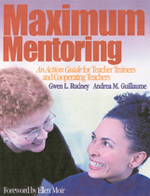 Several books have been written on this topic but as a mentor I have found few to be as beneficial and useful as this one. Maximum Mentoring discusses how experienced, talented teachers who have been trained as mentors can enhance any mentoring program. It demonstrates how mentors can provide a supportive environment where beginning teachers are encouraged to take risks and explore their role as educators.
Several books have been written on this topic but as a mentor I have found few to be as beneficial and useful as this one. Maximum Mentoring discusses how experienced, talented teachers who have been trained as mentors can enhance any mentoring program. It demonstrates how mentors can provide a supportive environment where beginning teachers are encouraged to take risks and explore their role as educators.
To be an effective mentor requires both time and a whole new set of skills. This book provides key information related to effective mentoring and guidance on its many roles and responsibilities. It also offers a variety of strategies for being effective in the role. I have used several of the activities and exercises provided while working with my own protege and we have both found them to be very beneficial.
Two chapters deal with observation, feedback and evaluation practices. In Ontario, with the new curriculum, these areas are key and there is little information out there on how to assist new teachers in dealing with them. This book provides detailed and explicit information on how to mentor in these areas. Another chapter is devoted to new teachers who are struggling and provides solid game plans for helping them through this difficult phase.
Maximum Mentoring will aid anyone involved in a mentor/protege relationship or induction program. It makes great sense and is a wonderful resource for those who want to contribute to the next generation of teachers.
![]() Maximum Mentoring, Corwin Press, Thousand Oaks, California, 2001, ISBN 0-7619-4636-5, softcover, 176 pages, US$29.95, tel 1-800-818-7243, fax 1-800-583-2665, www.corwinpress.com
Maximum Mentoring, Corwin Press, Thousand Oaks, California, 2001, ISBN 0-7619-4636-5, softcover, 176 pages, US$29.95, tel 1-800-818-7243, fax 1-800-583-2665, www.corwinpress.com
Reviewed by Victoria Houston, who teaches Grades 11 and 12 hospitality and tourism, including the Ontario Youth Apprenticeship Program at Century Secondary School for the Greater Essex County DSB in Windsor.
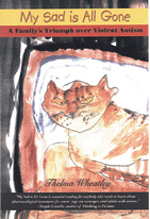 My Sad is All Gone
My Sad is All Gone
A Family's Triumph Over Violent Autism
by Thelma Wheatley
My Sad is All Gone is the true story of how the author's son, Julian, became suddenly violent, self-mutilating and "psychotic" in his early teens. He saw students jeering at him in the living room walls, tore strips of flesh off his face, threw himself through windows, beat up the parents who loved him and physically attacked his teachers.
Eventually, Julian took anti-psychotic medication, but it caused him to collapse - his head twisted sideways, his tongue hung out and his eyes bulged. His parents were desperate by the time Julian was 16 and they met Joseph Huggins, a family doctor with expertise in rage behaviours.
With Huggins's guidance, Julian began to make progress. Today, Julian has four community jobs and is a loving and loveable young man.
This is a powerful book. Funny, horrifying, immensely sad, it offers insight into the education of autistic/PDD (Pervasive Development Disorder) children and the world of psychiatry.
Author Thelma Wheatley is the first to publish a book about violence and self-mutilation in autism from a parent's viewpoint. But Wheatley is also a teacher - when her son's violence began, she specialized in teaching autistic/DC (Developmentally Challenged) children, and prior to her retirement she spent nine years working in the Peel District School Board.
The book will be particularly relevant if you have or teach autistic children, but anyone can appreciate the strengths in Wheatley's story.
![]() My Sad is All Gone, Lucky Press,
Lancaster, Ohio, 2004, ISBN 0-9760576-0-3, softcover, 288 pages, US$18.00, tel 866-308-6235 (Book Wheatley as a speaker: orchard@ica.net, tel 416-763-4408.)
My Sad is All Gone, Lucky Press,
Lancaster, Ohio, 2004, ISBN 0-9760576-0-3, softcover, 288 pages, US$18.00, tel 866-308-6235 (Book Wheatley as a speaker: orchard@ica.net, tel 416-763-4408.)
Reviewed by Robert Graham, who taught ESL for 27 years at Brockton High School and continues to do supply teaching for the Toronto DSB.
Ma première grammaire Bescherelle
by Jocelyne Cauchon
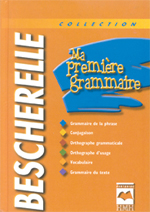 Jocelyne Cauchon, a learning consultant and linguist, designed Ma première grammaire Bescherelle so that students could make grammar an ally. This will be excellent for students in the upper elementary school grades where they can easily use it for self-revision.
Jocelyne Cauchon, a learning consultant and linguist, designed Ma première grammaire Bescherelle so that students could make grammar an ally. This will be excellent for students in the upper elementary school grades where they can easily use it for self-revision.
Each of its six sections - sentence grammar, conjugation, grammatical orthography, everyday spelling, vocabulary, text grammar - is identified by a colour, and tabs make it easy to locate information.
The author provides a clear structure and uses the question-answer format. Each page makes good use of graphics and illustrations. Headings and coloured boxes highlight key concepts. Symbols point to reminders, cross references, tips, recommendations, procedures and enriched concepts.
In a nutshell, this grammar reference designed by Cauchon is an excellent resource for student use in perfecting their written French.
![]() Ma première grammaire Bescherelle,
Les Éditions Hurtubise HMH, Montréal, 2003, ISBN 2-89428-465-9, hardcover, 496 pages, $24.95, tel 514-523-1523, fax 514-523-9969, www.hurtubisehmh.com
Ma première grammaire Bescherelle,
Les Éditions Hurtubise HMH, Montréal, 2003, ISBN 2-89428-465-9, hardcover, 496 pages, $24.95, tel 514-523-1523, fax 514-523-9969, www.hurtubisehmh.com
Reviewed by André Leverta Grade 3 teacher, retired from écoles des pionniers for the Conseil des écoles catholiques de langue française du centre-est in Ottawa.
The Literacy Principal
Leading, Supporting and Assessing Reading and Writing Initiatives
by David Booth and Jennifer Rowsell
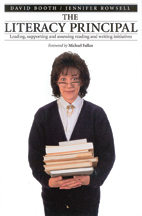 A lot of books about literacy are written for teachers. And there are a lot of books about leadership and educational change written for principals. The Literacy Principal is unusual because it combines these topics in a comprehensive book that tells principals and other school leaders what they need to know in order to effectively support school-based, literacy-focused educational change.
A lot of books about literacy are written for teachers. And there are a lot of books about leadership and educational change written for principals. The Literacy Principal is unusual because it combines these topics in a comprehensive book that tells principals and other school leaders what they need to know in order to effectively support school-based, literacy-focused educational change.
The book is divided into four chapters: Changing the Face of Literacy Education in Schools; Understanding Literacy Principles and Practices; Implementing Successful Literacy Initiatives; and Assessing from the Inside Out to Improve Literacy Standards.
Booth and Rowsell provide both the theory necessary to understand what must be done and the strategies to help put theory into practice.
I found it odd given the amount of research about the impact of school libraries on student achievement and literacy, that the authors ignore school libraries and teacher-librarians. Granted, in far too many places teacher-librarians are no more than a fond memory and access to a well-stocked school library, a dream. And yes, print-rich classrooms - and hallways and offices - are vitally important.
Still, it seems odd that in all the discussion of providing resources for students, providing professional resources and support for teachers, incorporating technology into the curriculum and creating a collaborative professional environment, Booth and Rowsell ignore what should be the literacy centre of a school and fail to mention the specialist teachers whose job description is, basically, all of the tasks just mentioned.
The Literacy Principal is essential reading for all administrators - at both the school and district levels. It's also recommended reading for teachers, both as an overview of literacy and an introduction to leadership and educational change. Leadership, as the authors point out, is not restricted to administrators.
![]() The Literacy Principal,
Pembroke Publishers, Markham, Ontario, 2002, ISBN 1-55138-146-X, soft-cover, 128 pages, $14.95, tel 905-477-0650 or 1-800-997-9807, fax 905-477-3691 or 1-800-339-5568, www.pembrokepublishers.com
The Literacy Principal,
Pembroke Publishers, Markham, Ontario, 2002, ISBN 1-55138-146-X, soft-cover, 128 pages, $14.95, tel 905-477-0650 or 1-800-997-9807, fax 905-477-3691 or 1-800-339-5568, www.pembrokepublishers.com
Reviewed by Brenda Dillon, who is the teacher-librarian at Philip Pocock Catholic Secondary School in the Dufferin-Peel Catholic DSB.
La lecture
de la théorie à la pratique
by Jocelyne Giasson
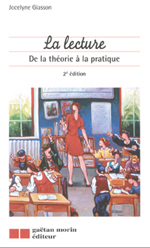
This large volume is designed for elementary school teachers and for those teaching French as a second language or special education.
Part 1 surveys current theories of reading acquisition - making meticulous distinctions between what reading is, how people learn to read and how to teach someone to read.
Part 2 provides solid practical information and advice for creating a good learning environment and organizing reading or book groups as well as mini-lessons for before, during and after reading. It also explains guided reading, guided comprehension, reading workshops, how to select appropriate texts, text genres (narrative, informative, instructional) and how to select vocabulary for dictation.
Part 3 is primarily concerned with the reading acquisition process and covers various learning stages - the emergent reader, early reader, transitional reader, apprentice reader and fluent reader.
Giasson concludes with a useful chapter on teaching interventions and activities - fill-in-the-blanks, historical figures, a biography project. It also covers reading assessment - a topic of interest to all teachers.
This text is indispensable for anyone who teaches reading.
![]() La lecture de la théorie à la pratique,
Gaëtan Morin Éditeur, Montreal, 2003, ISBN 2-89105-850-X, softcover, 416 pages, $45.95, tel 1-800-565-5531 or 514-273-1066, www.groupemorin.com
La lecture de la théorie à la pratique,
Gaëtan Morin Éditeur, Montreal, 2003, ISBN 2-89105-850-X, softcover, 416 pages, $45.95, tel 1-800-565-5531 or 514-273-1066, www.groupemorin.com
Reviewed by Jocelyne C. Hovenden, who teaches Grade 4 French Immersion at Agnes Taylor Public School in Brampton for the Peel DSB.
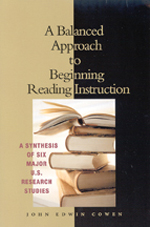 A Balanced Approach to Beginning Reading Instruction
A Balanced Approach to Beginning Reading Instruction
A Synthesis of Six Major U.S. Research Studies
by John Edwin Cowen
In this book John Edwin Cowen provides a synthesis of reading research studies from 1964 to 2000. He addresses the dilemma regarding phonics and whole-language approaches as methods for instructing beginning readers.
Cowen presents an overview of each of the six studies, outlining the major questions analyzed and the socio-economic structure of the research (a brief history of the authors of the study, who commissioned it and why) as well as the political climate and accepted norms for reading instruction of the time. He concludes with his assessment of the study's strengths and limitations.
Cowen also provides a concise timeline of the development of reading instruction over the past 40 years and notes the conclusion in each of six major US studies that an effective reading program must include elements of both phonics and whole-language methodologies. The book is a must-read for any teacher of beginning readers.
![]() A Balanced Approach to Beginning Reading Instruction,
International Reading Association, Newark, Delaware, softcover, 120 pages, US$18.95, tel 302-731-1600, fax 302-731-1057, www.reading.org
A Balanced Approach to Beginning Reading Instruction,
International Reading Association, Newark, Delaware, softcover, 120 pages, US$18.95, tel 302-731-1600, fax 302-731-1057, www.reading.org
Reviewed by Bonnie Caminiti, who teaches Kindergarten in Kanata.
The Kids Book of Great Canadians
by Elizabeth MacLeod Illustrated by John Mantha
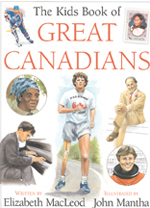 As with all greatest lists, one could argue about who was included and who was left out of Elizabeth MacLeod's The Kids' Book of Great Canadians. Why, for example, does Pierre Trudeau get a three-quarter-page write-up while Sir John A. MacDonald merits only eight lines? Why is Celine Dion included but not Bryan Adams? Why does Craig Kielburger get the half-page treatment, while notables such as David Suzuki, Stephen Leacock and John Kenneth Galbraith rank only a small paragraph each at the back of the book (under More Great Canadians)?
As with all greatest lists, one could argue about who was included and who was left out of Elizabeth MacLeod's The Kids' Book of Great Canadians. Why, for example, does Pierre Trudeau get a three-quarter-page write-up while Sir John A. MacDonald merits only eight lines? Why is Celine Dion included but not Bryan Adams? Why does Craig Kielburger get the half-page treatment, while notables such as David Suzuki, Stephen Leacock and John Kenneth Galbraith rank only a small paragraph each at the back of the book (under More Great Canadians)?
While the text is written for an audience of 8- to 12-year-olds and is meant to introduce young readers to significant Canadians in a variety of walks of life, teachers can use this book as a jumping off point for class discussions about what makes a Great Canadian and who the students would have put in the book.
MacLeod's write-ups on Louis Riel and René Lévesque could provide topics for junior or intermediate debates on the Great Canadian designation. Writing exercises, speeches or a class-made Great Canadians booklet could all stem from working with Great Canadians.
Most of the book provides two short biographies to a page. Double-page spreads are dedicated to the Fathers of Confederation, Nobel Prize winners and the Group of Seven. "Did You Know?" sidebars provide tidbits of information and boxed items giving dates and places of birth and death accompany illustrations of each subject.
At the end of the book, the More Great Canadians section provides 35 one-paragraph entries on other notables, past and present. The final two pages offer a timeline for everyone included as well as for selected events in Canadian history.
John Mantha's illustrations leave a lot to be desired as many of the cartoon-like drawings bear only a passing resemblance to their subject. Photographs would have been far better. But the book is a great starting point for student research on significant Canadian figures and is perfect for casual browsing during silent reading times. Besides, more Canadiana in the classroom is always a welcome thing.
![]() The Kids Book of Great Canadians,
Kids Can Press, Toronto, 2004, ISBN 1-55337-366-9, hardcover, 64 pages, $19.95, tel 416-925-5437, fax 416-960-5437, www.kidscanpress.com
The Kids Book of Great Canadians,
Kids Can Press, Toronto, 2004, ISBN 1-55337-366-9, hardcover, 64 pages, $19.95, tel 416-925-5437, fax 416-960-5437, www.kidscanpress.com
Reviewed by Chris Vert, who is on leave of absence from the Island Public/Natural Science School in Toronto.
The Kids Guide to Money Cent$
by Keltie Thomas
Illustrated by Stephen MacEachern
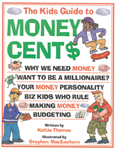 The Kids Guide to Money Cent$ is a fun way for children to become financially aware.
The Kids Guide to Money Cent$ is a fun way for children to become financially aware.
In the book, the Money Cents Gang completes a research project on various money-related topics - why we need it, banking, playing the stock market, getting a job and more. Each topic is presented in a colourful two-page spread, consisting of a comic strip with short blocks of text. Quizzes and activities engage readers and encourage them to think before they spend.
Money Cent$ is a great introduction to the world of money and will likely inspire many child-led discussions. It is suitable for a read-aloud and easily lends itself to extension activities in mathematics or language arts. Parents will also enjoy reading the book to their children. For independent readers, it is best suited to Grades 4 to 6.
![]() The Kids Guide to Money Cent$,
Kids Can Press, Toronto, 2004, ISBN 1-55337-391-X, softcover, 56 pages, $8.95, tel 416-925-5437, fax 416-960-5437, www.kidscanpress.com
The Kids Guide to Money Cent$,
Kids Can Press, Toronto, 2004, ISBN 1-55337-391-X, softcover, 56 pages, $8.95, tel 416-925-5437, fax 416-960-5437, www.kidscanpress.com
Reviewed by Kim Luinstra, who teaches Grades 3 and 4 at St. Anthony's for Bruce-Grey Catholic DSB in Kincardine.
Apprendre . avec Réflecto
by Pierre Paul Gagné and Louis-Philippe Longpré
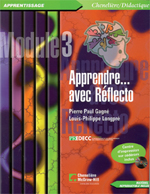 In this book, the idea of role playing is explored as a means of teaching skills, which is both interesting and appropriate. The authors suggest occupations that are well known to most children - including basic examples such as detective, librarian, architect, explorer, inspector, carpenter, referee and, finally, orchestra conductor.
In this book, the idea of role playing is explored as a means of teaching skills, which is both interesting and appropriate. The authors suggest occupations that are well known to most children - including basic examples such as detective, librarian, architect, explorer, inspector, carpenter, referee and, finally, orchestra conductor.
The language used is based on students' managerial ability and suggests a method that permits students to become more responsible for their learning and able to further develop thinking skills.
Students become aware of the information needed. They organize it, explore it, check it and duplicate it following a plan, while also verifying its relevance and expressing their thoughts.
There are interesting activities and some can be integrated right from the first few weeks of school. The CD-ROM includes easy-to-use, reproducible materials.
This is a useful, enjoyable and very well presented tool.
Teachers, make it a gift to yourselves, and you will also be giving a gift to your students.
![]() Apprendre . avec Réflecto book with CD-ROM includes reproduceable materials), les Éditions de la Chenelière, Montréal, 2004, ISBN 2-7651-0367-4, softcover, 100 pages, $55.95, tel 1-800-565-5531, www.cheneliere-education.ca
Apprendre . avec Réflecto book with CD-ROM includes reproduceable materials), les Éditions de la Chenelière, Montréal, 2004, ISBN 2-7651-0367-4, softcover, 100 pages, $55.95, tel 1-800-565-5531, www.cheneliere-education.ca
Reviewed by Josée Lortie, who teaches Grade 6 at école St-Jean-Baptiste in Orignal.
French-Language Services Co-ordinator
The College is currently looking for qualified candidates who possess solid experience for the position of: French-Language Services Co-ordinator.
You are a highly qualified educator whose record of success as a leader in a French-language district school board in Ontario has prepared you to be a member of the senior leadership team of the Ontario College of Teachers.
As a member in good standing with the College, you have an in-depth knowledge of current educational issues, policy development, self-regulation and the mandate of the College, particularly in terms of the 12 francophone school systems in Ontario.
You are an excellent communicator and problem-solver who is enthusiastic about working with the senior leadership team to enhance the College's services to the francophone educational community.
As part of the Senior Leadership team, the French-Language Services Co-ordinator will report directly to the Registrar and Chief Executive Officer.
The successful candidate and the Registrar will negotiate the starting date for this position.
The Ontario College of Teachers offers competitive salaries, comprehensive benefits and a modern, progressive work environment.
To apply, please send your resumé and refer to the position of interest, no later than January 5, 2005, to:
Frank McIntyre,
Human Resources
Ontario College of Teachers
121 Bloor Street East
Toronto, ON M4W 3M5
Fax 416 961 8822 or e-mail careers@oct.ca.
For more information on the College, visit our web site at www.oct.ca.








